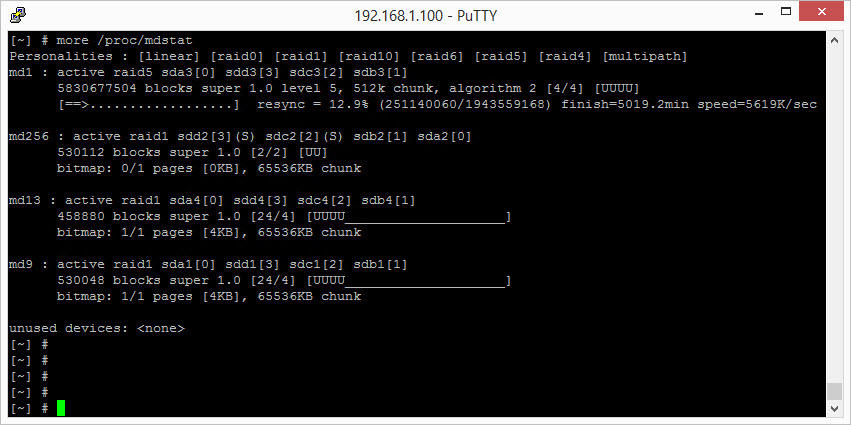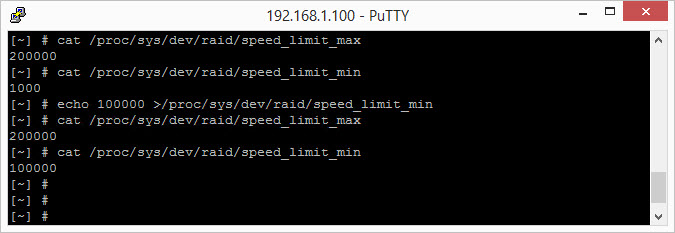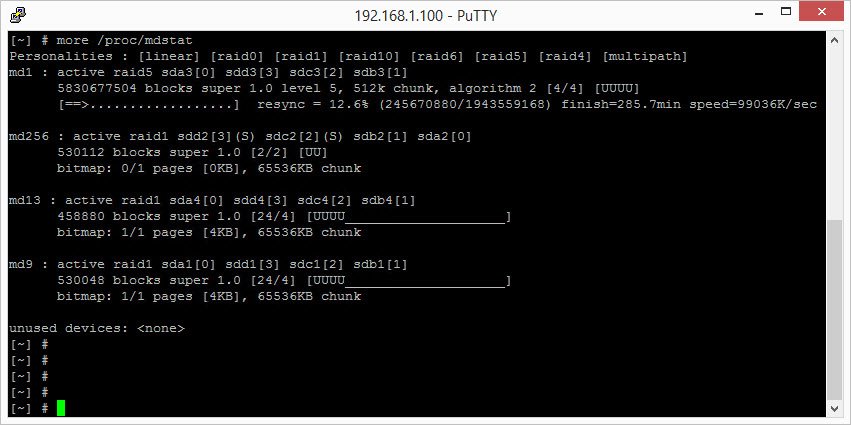Frequently Asked Question
Storage: How to increase QNAP Storage Raid rebuild speed?
Last Updated 9 years ago
Increase the Speed of Linux Software RAID Reconstruction
If you are in a situation where you sit in front of the console (or on a remote ssh connection) waiting for a Linux software RAID to finish rebuilding (either you added a new drive, or you replaced a failed one, etc.) then you might be frustrated by how slow this process is running. You are running cat on /proc/mdstat repeatedly (you should really use watch in this case ;)), and this seems to never finish…
Obviously that there is a logical reason for this ‘slowness’ and on a production system you should leave it running with the defaults. But in case you want to speed up this process here is how you can do it. This will place a much higher load on the system so you should use it with care.
To see your Linux kernel speed limits imposed on the RAID reconstruction use:
In the system logs you can see something similar to:
This means that the minimum guaranteed speed of the rebuild of the array is approx 1MB/s. The actual speed will be higher and will depend on the system load and what other processes are running at that time. In case you want to increase this minimum speed you need to enter a higher value in speed_limit_min.
For example to set this to approx 50 megabytes per second as minimum use:
The results are instant…
Actual Scenario:
Before Speed Up, it require 5019.2min.
How to Speed Up, following the guide.

After Speed Up, rebuild can be finish approx. 285.7min.

Note:
- Don't be too greedy to max the speed, rebuild process might crash due to HDD failure.
- Remember to set it back to "1000" fpr speed_limit_min
Refer link: http://www.ducea.com/2006/06/25/increase-the-speed-of-linux-software-raid-reconstruction/
If you are in a situation where you sit in front of the console (or on a remote ssh connection) waiting for a Linux software RAID to finish rebuilding (either you added a new drive, or you replaced a failed one, etc.) then you might be frustrated by how slow this process is running. You are running cat on /proc/mdstat repeatedly (you should really use watch in this case ;)), and this seems to never finish…
Obviously that there is a logical reason for this ‘slowness’ and on a production system you should leave it running with the defaults. But in case you want to speed up this process here is how you can do it. This will place a much higher load on the system so you should use it with care.
To see your Linux kernel speed limits imposed on the RAID reconstruction use:
cat /proc/sys/dev/raid/speed_limit_max
200000
cat /proc/sys/dev/raid/speed_limit_min
1000 In the system logs you can see something similar to:
| 1 2 | md: minimum _guaranteed_ reconstruction speed: 1000 KB/sec/disc. |
This means that the minimum guaranteed speed of the rebuild of the array is approx 1MB/s. The actual speed will be higher and will depend on the system load and what other processes are running at that time. In case you want to increase this minimum speed you need to enter a higher value in speed_limit_min.
For example to set this to approx 50 megabytes per second as minimum use:
echo 50000 >/proc/sys/dev/raid/speed_limit_min The results are instant…
Actual Scenario:
Before Speed Up, it require 5019.2min.
How to Speed Up, following the guide.
After Speed Up, rebuild can be finish approx. 285.7min.
Note:
- Don't be too greedy to max the speed, rebuild process might crash due to HDD failure.
- Remember to set it back to "1000" fpr speed_limit_min
echo 1000 >/proc/sys/dev/raid/speed_limit_min Refer link: http://www.ducea.com/2006/06/25/increase-the-speed-of-linux-software-raid-reconstruction/
ZGTLv160101